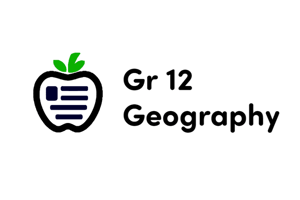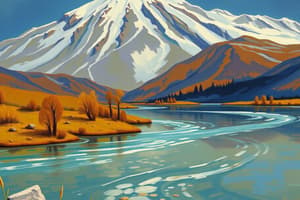Podcast
Questions and Answers
What is geography?
What is geography?
The study of Earth's natural features.
What is climate?
What is climate?
The pattern of weather conditions in a certain location over a long period of time.
What is a landform?
What is a landform?
A naturally formed feature on Earth's land surface, such as an island, a mountain, or a plateau.
What is weather?
What is weather?
What is vegetation?
What is vegetation?
What is cartography?
What is cartography?
What is projection?
What is projection?
What does latitude measure?
What does latitude measure?
What does longitude measure?
What does longitude measure?
What are physical maps?
What are physical maps?
What are political maps?
What are political maps?
What is archaeology?
What is archaeology?
What is an artifact?
What is an artifact?
What is excavation?
What is excavation?
What is anthropology?
What is anthropology?
What is culture?
What is culture?
How can you study culture?
How can you study culture?
Who is a historian?
Who is a historian?
What is a primary source?
What is a primary source?
What is a secondary source?
What is a secondary source?
What is oral history?
What is oral history?
How do primary, secondary, and oral history help historians learn more about the past?
How do primary, secondary, and oral history help historians learn more about the past?
What is the Prime Meridian?
What is the Prime Meridian?
What is an anthropologist?
What is an anthropologist?
What is an archaeologist?
What is an archaeologist?
What are the stages of civilization?
What are the stages of civilization?
What are some examples of landforms?
What are some examples of landforms?
What is absolute location?
What is absolute location?
What types of information do thematic maps show?
What types of information do thematic maps show?
What are the five themes of geography?
What are the five themes of geography?
Why are maps important to historians?
Why are maps important to historians?
What new evidence prompted archaeologists to rethink their ideas about the Mayan civilization?
What new evidence prompted archaeologists to rethink their ideas about the Mayan civilization?
What does new evidence sometimes force historians to do?
What does new evidence sometimes force historians to do?
Flashcards
Geography
Geography
The study of Earth's natural features and how they affect human life.
Landforms
Landforms
Naturally occurring features like mountains, islands, and plateaus.
Climate
Climate
Long-term weather patterns in specific locations.
Cartography
Cartography
Signup and view all the flashcards
Projections
Projections
Signup and view all the flashcards
Physical maps
Physical maps
Signup and view all the flashcards
Political maps
Political maps
Signup and view all the flashcards
Archaeology
Archaeology
Signup and view all the flashcards
Artifacts
Artifacts
Signup and view all the flashcards
Excavation
Excavation
Signup and view all the flashcards
Anthropology
Anthropology
Signup and view all the flashcards
Primary sources
Primary sources
Signup and view all the flashcards
Secondary sources
Secondary sources
Signup and view all the flashcards
Oral history
Oral history
Signup and view all the flashcards
Latitude
Latitude
Signup and view all the flashcards
Longitude
Longitude
Signup and view all the flashcards
Absolute location
Absolute location
Signup and view all the flashcards
Thematic maps
Thematic maps
Signup and view all the flashcards
Five themes of geography
Five themes of geography
Signup and view all the flashcards
Stages of civilization development
Stages of civilization development
Signup and view all the flashcards
Maps for historical context
Maps for historical context
Signup and view all the flashcards
New archaeological evidence
New archaeological evidence
Signup and view all the flashcards
Adapting historical hypotheses
Adapting historical hypotheses
Signup and view all the flashcards
Mayan civilization
Mayan civilization
Signup and view all the flashcards
Historical research methods
Historical research methods
Signup and view all the flashcards
Anthropology
Anthropology
Signup and view all the flashcards
Archaeology
Archaeology
Signup and view all the flashcards
Cartography
Cartography
Signup and view all the flashcards
Human geography
Human geography
Signup and view all the flashcards
Study Notes
Geography and Earth Features
- Geography studies Earth's natural features and influences human life.
- Landforms are naturally occurring features like mountains, islands, and plateaus.
- Climate defines long-term weather patterns in specific locations.
Maps and Cartography
- Cartography involves skills and methods for map creation.
- Projections represent Earth’s curved surface on flat maps, managing distortion.
- Physical maps illustrate landforms and bodies of water in specific areas.
- Political maps highlight human-created features on Earth's surface.
Archaeology and Anthropology
- Archaeology focuses on recovering and studying physical evidence from the past.
- Artifacts are human-made objects significant for historical understanding.
- Excavation involves digging for historically meaningful objects.
- Anthropology studies human societies, cultures, and their development.
Historical Research Methods
- Historians interpret the past, utilizing primary sources (documents or artifacts from their time) and secondary sources (created later).
- Oral history consists of verbal accounts passed through generations, providing cultural insights.
- Primary, secondary, and oral histories help historians frame questions and derive answers about historical contexts.
Geographic Coordinates
- Latitude measures distance north or south of the equator.
- Longitude measures distance east or west of the Prime Meridian.
- Absolute location identifies a precise point using latitude and longitude intersections.
Thematic and Civilization Studies
- Thematic maps convey physical and political information using colors for differentiation.
- The five themes of geography include location, place, human-environment interaction, movement, and region.
- Stages of civilization development encompass farming, crafts, trade, towns, writing systems, and government formation.
Importance of Maps and New Evidence
- Maps assist historians by overlaying historical routes onto modern geography to illustrate changes and contexts.
- New archaeological evidence, like the findings in Cancuen, can challenge existing theories about civilizations, such as the Mayans.
- Historians adapt their hypotheses based on new evidence, re-evaluating prior understandings accordingly.
Studying That Suits You
Use AI to generate personalized quizzes and flashcards to suit your learning preferences.




